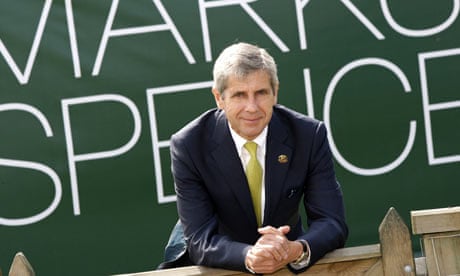The outgoing boss of Marks & Spencer scooped a bumper £4.3m in pay and bonuses last year – an increase of nearly 140% on the previous 12 months.
Sir Stuart Rose, 61, was awarded a bonus of £2.8m in a year when M&S delivered a 5% increase in profits to £632m. The chain's share price climbed 17% over its financial year – substantially less than the FTSE 100 gained in the same period.
Annual profits are still way below the £1bn recorded two years ago and the shares have slipped back 8% since the year-end in March. Rose did not earn a bonus in the previous year, when his salary and benefits totalled £1.8m. Other members of the M&S board were also rewarded with big bonuses. Together the five executive directors earned more than £12m, with clothing and homewares director Kate Bostock paid £2.5m and marketing director Steven Sharp receiving £2.3m.
Bostock's basic salary of £549,000 was boosted with a bonus of £1.4m, a £255,000 cash "retention payment" and a £51,000 relocation allowance as well as a cash payment in lieu of pension contributions and nearly £40,000 of perks. The relocation payment was paid when Bostock took on homewares as well as clothing and needed to spend more time in the Paddington head office. An M&S spokeswoman said Bostock had moved "closer to London" from her home in Leicester.
Sharp, who last year dropped a number of the so-called "faces of M&S", including Lily Cole and Elizabeth Jagger, to bring in new ones such as Dannii Minogue and Lisa Snowdon, was rewarded with a £1.5m bonus on top of his £614,000 basic salary and other payments.
The report also reveals that Bostock and Sharp won a 12% rise in their basic pay. Bostock's increase was a result of her promotion, while Sharp got a rise "to reflect the continuing importance of the branding and marketing of M&S".
Other directors are also receiving a 2.5% increase in their basic salaries, after a freeze in basic pay the previous year. The executive payouts compare with staff bonuses averaging £500 a head, part of an £81m bonus pot announced in May.
The scale of the boardroom payouts is likely to further inflame M&S shareholders, some of whom have already made it known that they intend to vote against the M&S pay report in protest at the package handed to Marc Bolland, who will take over from Rose next month. Bolland could earn up to £15m in his first year, with £4.9m guaranteed, regardless of performance.
Over the past two years M&S's relationship with its shareholders has deteriorated, as the retailer has failed to comply with corporate governance guidelines and tested investors' patience with generous incentive schemes. Rose is due to hand control of the retail empire to Bolland at the end of July. At that point he will become part-time chairman, with a salary of £875,000 – making him the highest paid non-executive chairman of a FTSE 100 company. He is due to leave by the end of March next year.
In the annual report, remuneration committee chairman Steven Holliday, chief executive of National Grid, said Bolland's pay was designed to "attract and retain leaders who are focused and encouraged to deliver business priorities within a framework that is aligned with the interests of the company's shareholders".

Comments (…)
Sign in or create your Guardian account to join the discussion